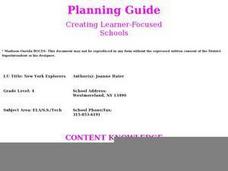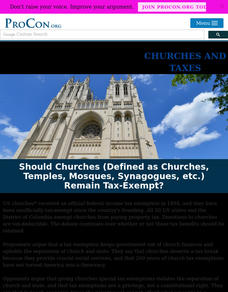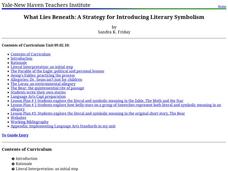Curated OER
New York Vocabulary
In this vocabulary activity learning exercise, students read the statements about New York and write 10 vocabulary words from the word bank to complete the statements.
The New York Times
Teaching Orwell and '1984’ with the New York Times
Doublethink and alternate facts? Big Brother and Facebook? 1984 and 2019? Sales of 1984 have surged and so has the use of George Orwell's dystopian classic in classrooms. Whether new to teaching the novel or a seasoned veteran you'll...
Curated OER
New York Explorers
Fourth graders investigate the early explorers of New York state. They identify their country of origin, reason for exploration, and the results. They produce a PowerPoint based on their results.
Curated OER
And the Streets Are Paved With Gold
Students explore immigrant experience at Ellis Island, New York, at the turn of the century, and answer questions that challenge them to use thinking skills from various levels of Bloom's taxonomy.
Curated OER
How Often Do You Interact with People of Another Race or Ethnicity?
Is interacting with people from different backgrounds part of a well-rounded education? A big question awaits young readers as they explore two New York Times articles that discuss modern-day segregation, population statistics, and...
Curated OER
Active Reading with American History
Explore connections within and between informational texts with this lesson about encyclopedia articles. Middle schoolers write encyclopedia articles focusing on topics in American history. They discuss how to determine credibility...
Curated OER
Student Opinion: What Teacher Do You Appreciate?
This online resource is composed of a writing sample about teacher appreciation and a writing prompt for learners. You could use this as an in-class journal activity or you could have class members post their responses on the New York...
The New York Times
Evaluating Sources in a ‘Post-Truth’ World: Ideas for Teaching and Learning about Fake News
The framers of the United States Constitution felt a free press was so essential to a democracy that they granted the press the protection it needed to hold the powerful to account in the First Amendment. Today, digital natives need to...
Curated OER
Churches and Taxes
Churches have been tax-exempt since the founding of America, but should they be? Pupils ponder the question as they browse the website in preparation for a class debate or discussion. They research the history of tax-exemption for...
Curated OER
"I" Witness to History
Young journalists write diary entries from the point of view of a person involved in a historical event. They focus on including facts, clear narration, and accurate description of the individual's feelings.
EngageNY
TASC Transition Curriculum: Workshop 12
How can opinions slant facts? Workshop participants learn how to examine primary and secondary sources and identify the author's point of view. They also examine how visual art impacts the meaning and rhetoric of sources. Full of...
Curated OER
Water Cycle Reading and Writing
Here is a great way to get pupils to express a scientific concept in a fun way. After hearing the story of Walter the Water drop and learning facts about the water cycle, the class will write a creative expository piece describing what...
Curated OER
Rhode Island Challenge
In this recognizing facts about the state of Rhode Island activity, students read factual information and choose the who, what, or where answer. Students choose 10 multiple choice answers.
Scholastic
Persausive Writing
A unit on persuasive writing guides elementary learners through the writing process. The first part examines the elements of persuasive writing, including expressing an opinion, connecting ideas, using supporting facts, and writing...
ProCon
Daylight Savings Time
An entomologist named Geroge Vernon Hudson is credited with proposing Daylight Saving Time (DST) so he could better study his insects. Using the informative website, scholars read a brief introduction to the topic and then explore the...
Curated OER
Evaluating Information on Food Labels
What kinds of foods include corn? Corn syrup? Start by viewing a clip of Food Inc. with your middle or high schoolers. Then, study a list of corn-derived ingredients, encouraging your class to see how many food products contain corn. A...
Curated OER
8th Grade Reading Comprehension Success
Augment your eighth grade language arts curriculum with a thorough set of reading comprehension activities and assessments. Focusing on a variety of skills, including vocabulary in context, text structure, main idea, and author's style,...
Curated OER
Practice Book O
Whether you need resources for reading comprehension, literary analysis, phonics, vocabulary, or text features, an extensive packet of worksheets is sure to fit your needs. Based on a fifth-grade curriculum but applicable to any level of...
EngageNY
Planning for Writing: Introduction and Conclusion of a Literary Analysis Essay
First and last impressions are important. Using the helpful resource, scholars draft the introductory and concluding paragraphs of their literary analysis essays. Next, they use a writing evaluation rubric to self-assess their work.
Yale University
What Lies Beneath: A Strategy for Introducing Literary Symbolism
“It’s not about what it is, it’s about what it can become.” You’re never too old for Dr. Seuss and using The Sneetches and The Lorax is a great way to introduce readers to allegories, parables, and literary symbolism. The lessons...
Curated OER
Telling Our Stories of Giving - Writing to Persuade
After identifying the parts of a persuasive piece of writing, young writers explore different prewriting activities for the persuasive essay. They have the option to write a news article, personal narrative, or persuasive essay to...
Curated OER
The Rose Center
Young scholars utilize Internet sites to improve word recognition, increase vocabulary and comprehension of the English language. They complete a worksheet stating facts from selected Internet sites. They write a composition about the...
Curated OER
"I Cannot Tell a Lie"
Students examine and debunk historical myths, using the American Revolution as a starting point. They create and play a game of "American History: Fact or Fiction?"
Curated OER
Paul Revere
In this Paul Revere instructional activity, students read facts about Paul Revere's life and answer 10 fill-in-the blank comprehension questions.

























